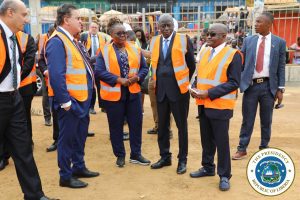World Bank Regional Vice President for Western and Central Africa, Ousman Diagana has stressed the need for the speedy implementation of the Bank’s sponsored road projects by the Liberian government.
Diagana who visited the country recently, was accompanied by President George M. Weah with a host of government officials including Public Works Minister, Ruth Koker Collins, Finance Minister, Smauel Tweah and Foreign Minister, Dee Maxwell Kemeyah among others inspected projects sponsored by the Bank.
Some of the projects inspected are the ongoing road rehabilitation work on the 6.1 km road linking S.D. Cooper Road to Coca-Cola Factory Road, including ELWA and Red-Light Junctions, which are funded by the World Bank through Liberia Road Asset Management Project (LIBRAMP).
Additionally, the World Bank Regional Vice President was taken on a guided tour of the Invincible Sports Park along the Tubman Boulevard and the under-construction PHP Sports for Development Center behind the Barclay Training Center (BTC) which is not part of the Bank sponsored projects.
But in an exclusive interview with FrontPageAfrica online, Mr. Diagana expressed his dissatisfaction over the form and manner the Bank sponsored projects is being done, disclosing that upon the inspections, he held meetings with President Weah and expressed the need for Liberia to do better in terms of implementation.
According to him, “time of the essence” for a country like Liberia that is aspiring for development and as such, development partners’ developmental projects must be accelerated.

“This is something that we have brought to the attention of the government. The resources are available from the World Bank, there’s technical expertise in country from the World Bank, we have expanded significantly our presence in Liberia to support the country but we are not in charge of the implementation of the projects.
“So, if there are delays, of course, it’s on the government’s side, and in terms of implementation, the country could do better and we have discussed this with them and subsequently, for the next generations of the programs we will see some progress,” Diagana stated
He however disclosed that though he is not satisfied with the level of progress Liberia has made in terms of project implementation, the country is not lagging behind other countries in the region as they all face similar capacity constraints.
Meanwhile, Mr. Diagana has also further revealed that Liberia has in recent time seen increased resources from the World Bank as a result of several improvements that the country has made in terms of accountability, good management of resources, good public policies and good implementation of programs among others.

He added that there is a need for Liberia to perform better in order to have access to more resources from the Bank, emphasizing, “the Bank does not dwell on the shortcomings of any country, rather, it tries to put in place mechanisms that would have countries like Liberia improve on its overall governance and management of resources and is part of the Bank’s policy dialogue.”
It can be recalled that Liberia joined the World Bank Group on March 28, 1962 and since then the Bank has been one of Liberia’s key development partners, supporting major investments in health, education, energy, agriculture, fisheries and transport.
The World Bank’s affiliate, IFC, has also been a key supporter of various private sector activities. Total current World Bank portfolio for Liberia stands at $1.3 billion, covering 22 national projects ($912 million) and 4 regional projects ($402 million).
President George M. Weah during the tour acknowledged the Bank’s increased support to Liberia, which he said has grown significantly, with national IDA commitments doubling from just under $500 million US dollars to close to $1 billion US dollars from 2019.

“This is a manifestation of the confidence that the Bank has in my Government’s vision for our Country and such a support aligns with Government’s strategic approach to finding lasting solutions to the problems that have plagued the Liberian people for years,” the Liberian leader intoned.
President Weah noted, “partnership has shown that the Bank is not only in Liberia to support the government financially, but also to help mobilize even more resources from other sources in order to bridge our infrastructure deficit, especially in the road and energy sectors.”

